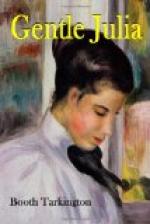“You hadn’t what?” he cried.
“I hadn’t met his mother!”
Noble leaped to his feet. “Julia! You aren’t—you aren’t engaged?”
“I am not,” she answered decisively. “If I ever was—in the slightest—I certainly am not now.”
Poor Noble was transfigured. He struggled; making half-formed gestures, speaking half-made words. A rapture glowed upon him.
“Julia—Julia——” He choked. “Julia, promise me something. Will you promise me something? Julia, promise to promise me something.”
“I will,” she said quickly. “What do you want me to do?”
Then he saw that it was his time to speak; that this was the moment for him to dare everything and ask for the utmost he could hope from her.
“Give me your word!” he said, still radiantly struggling. “Give me your word—your word—your word and your sacred promise, Julia—that you’ll never be engaged to anybody at all!”
CHAPTER TWENTY-THREE
At six minutes after four o’clock on the second afternoon following Julia’s return, Noble Dill closed his own gate behind him and set forth upon the four-minute walk that would bring him to Julia’s. He wore a bit of scarlet geranium in the buttonhole of his new light overcoat; he flourished a new walking-stick and new grey gloves. As for his expression, he might have been a bridegroom.
Passing the mouth of an alley, as he swung along the street, he was aware of a commotion, of missiles hurled and voices clashed. In this alley there was a discord: passion and mockery were here inimically intermingled.
Casting a glance that way, Noble could see but one person; a boy of fourteen who looked through a crack in a board fence, steadfastly keeping an eye to this aperture and as continuously calling through it, holding his head to a level for this purpose, but at the same time dancing—and dancing tauntingly, it was conveyed—with the other parts of his body. His voice was now sweet, now piercing, and again far too dulcet with the overkindness of burlesque; and if, as it seemed, he was unburdening his spleen, his spleen was a powerful one and gorged. He appeared to be in a torment of tormenting; and his success was proved by the pounding of bricks, parts of bricks and rocks of size upon the other side of the fence, as close to the crack as might be.
“Oh, dolling!” he wailed, his tone poisonously amorous. “Oh, dolling Henery! Oo’s dot de mos’ booful eyes in a dray bid nasty world. Henery! Oh, has I dot booful eyes, dolling Pattywatty? Yes, I has! I has dot pretty eyes!” His voice rose unbearably. “Oh, what prettiest eyes I dot! Me and Herbie Atwater! Oh, my booful eyes! Oh, my booful——”
But even as he reached this apex, the head, shoulders, and arms of Herbert Atwater rose momentarily above the fence across the alley, behind the tormentor. Herbert’s expression was implacably resentful, and so was the gesture with which he hurled an object at the comedian preoccupied with the opposite fence. This object, upon reaching its goal, as it did more with a splash than a thud, was revealed as a tomato, presumably in a useless state. The taunter screamed in astonishment, and after looking vainly for an assailant, began necessarily to remove his coat.




